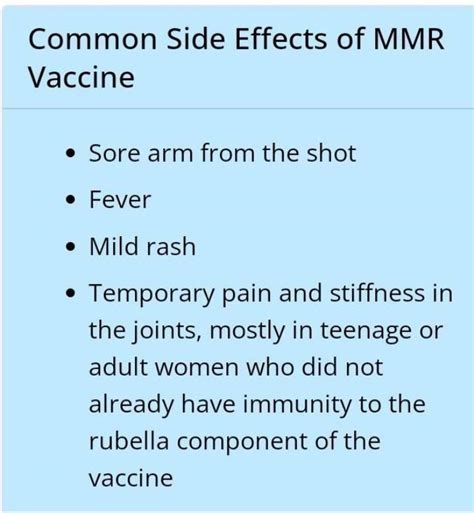The MMR vaccine, designed to protect against measles, mumps, and rubella, is a cornerstone of modern vaccination programs. While it has been instrumental in significantly reducing the incidence of these diseases, like any medical intervention, it can come with side effects. Understanding these side effects and how to minimize them is crucial for parents and individuals alike. This comprehensive guide will delve into the common side effects of the MMR vaccine, expert advice on minimizing these effects, and address frequently asked questions to ensure that readers are well-informed.
Introduction to the MMR Vaccine
The MMR vaccine is administered in two doses, the first typically given to children around 12 to 15 months of age, and the second dose between 4 to 6 years of age. This vaccine schedule is designed to ensure that children are protected against measles, mumps, and rubella before they start school, a time when the risk of exposure to these diseases can increase due to the close proximity of children in educational settings.
Common Side Effects of the MMR Vaccine
While the MMR vaccine is considered safe, it can cause side effects in some individuals. These side effects are usually mild and temporary, resolving on their own within a few days. The most common side effects include:
- Fever: A low-grade fever can occur in some children after receiving the MMR vaccine.
- Redness and Swelling at the Injection Site: The area where the shot was given might become red, swollen, or feel sore.
- Mild Rash: Some children may develop a mild rash after vaccination.
- Loss of Appetite: There might be a temporary decrease in appetite following the vaccination.
- Fatigue: Feeling tired or sluggish is another possible side effect.
Rarely, more serious side effects can occur, such as allergic reactions, which can be life-threatening. It is crucial to seek immediate medical attention if any severe symptoms appear after receiving the MMR vaccine.
Expert Advice on Minimizing Side Effects
To minimize the side effects of the MMR vaccine, healthcare providers and pediatricians often recommend the following strategies:
- Monitoring Body Temperature: Regularly checking for fever after the vaccination and using fever-reducing medications like acetaminophen (Tylenol) if necessary, as directed by a healthcare provider.
- Rest and Hydration: Encouraging the child to rest and drink plenty of fluids can help alleviate side effects like fatigue and loss of appetite.
- Local Care for the Injection Site: Applying a cool, damp cloth to the injection site can help reduce redness and swelling.
- Observation for Serious Side Effects: Keeping a close eye on the child for any signs of serious side effects and seeking medical help immediately if they occur.
Understanding the Importance of the MMR Vaccine
Despite the side effects, the benefits of the MMR vaccine far outweigh the risks. Measles, mumps, and rubella can lead to severe complications, including deafness, brain damage, and even death. The widespread use of the MMR vaccine has led to a significant reduction in the incidence of these diseases, protecting not only the vaccinated individuals but also contributing to herd immunity, which is crucial for protecting those who cannot be vaccinated due to certain medical conditions.
Addressing Misconceptions
There have been misconceptions and controversies surrounding the MMR vaccine, particularly concerning a now-discredited link between the vaccine and autism. Numerous scientific studies have thoroughly debunked this claim, reaffirming the safety of the MMR vaccine. It is essential for parents and caregivers to consult credible sources of information and healthcare professionals when making decisions about vaccinations.
Frequently Asked Questions
Is the MMR vaccine safe for children with allergies?
+The MMR vaccine is safe for most children, including those with common allergies. However, it's crucial for parents to discuss any allergies or concerns with their healthcare provider before the vaccination.
Can the MMR vaccine cause autism?
+Extensive research has consistently shown that there is no link between the MMR vaccine and autism. The original study suggesting a link has been widely discredited, and numerous subsequent studies have found no association.
What are the risks if I don't vaccinate my child against measles, mumps, and rubella?
+Not vaccinating your child against measles, mumps, and rubella puts them at risk of contracting these diseases, which can lead to serious complications, including hospitalization and, in rare cases, death. Additionally, unvaccinated individuals can spread these diseases to others, including those who cannot be vaccinated due to certain medical conditions.
Conclusion
The MMR vaccine is a vital tool in preventing the spread of measles, mumps, and rubella. While it is associated with some side effects, these are typically mild and temporary. By understanding the common side effects, following expert advice on how to minimize them, and recognizing the importance of vaccination in protecting public health, individuals can make informed decisions about their health and the health of their children. As with any medical intervention, it’s essential to weigh the benefits against the risks and to consult with healthcare professionals for personalized advice.



